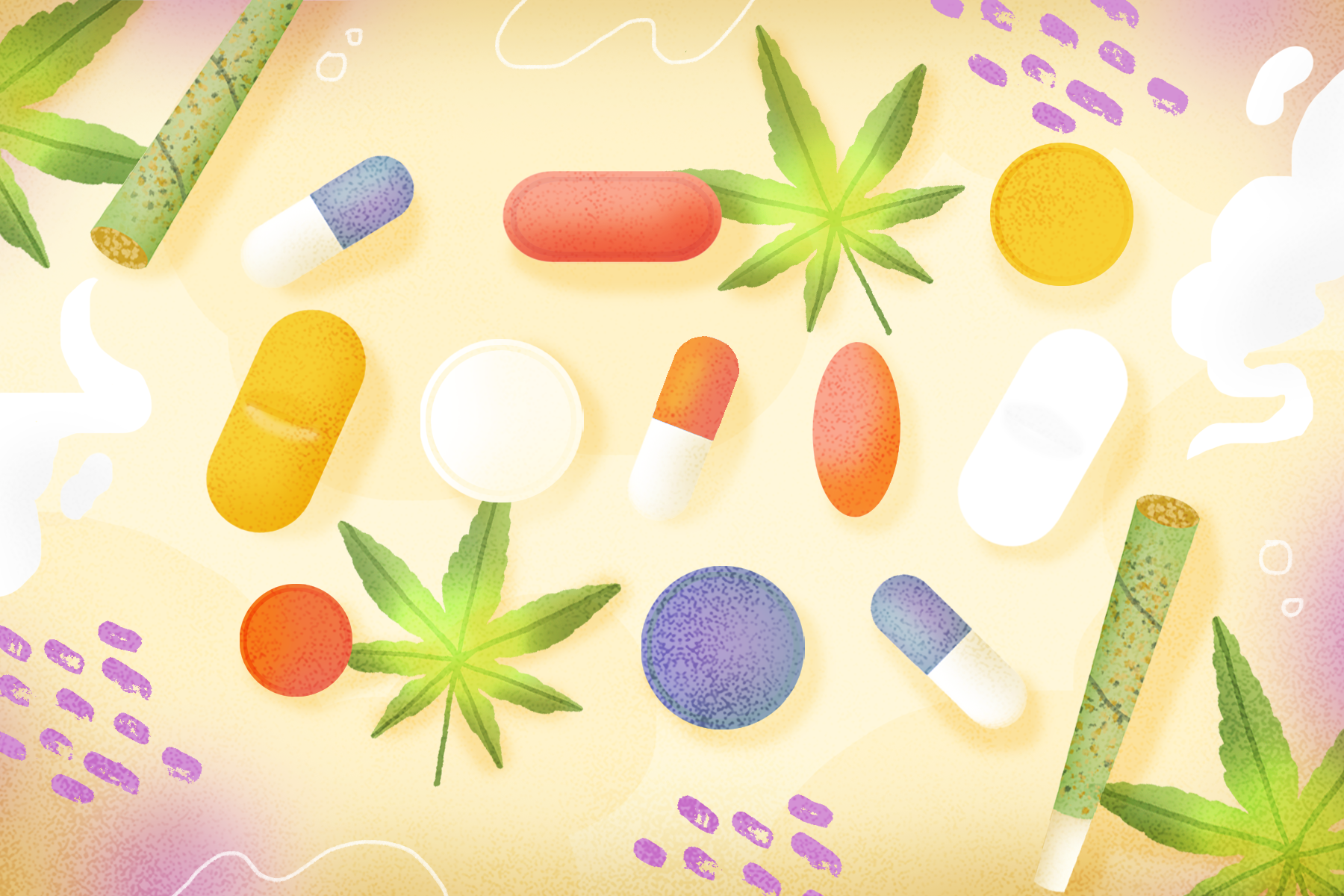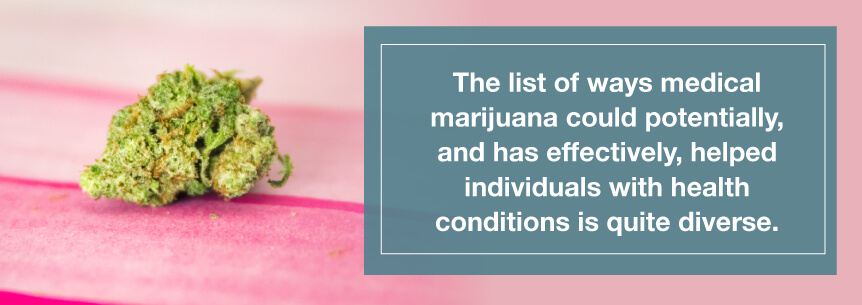
Depression, anxiety, and bipolar disorder are among the most prevalent mental health conditions that impact people of all ages across the country. These disorders can feel difficult to manage, but there are treatments available that can help. Antidepressants are typically the standard in treating anxiety, depression, and other mood disorders. However, an increasing number of adults rely on medical marijuana to treat their symptoms in conjunction with or instead of pharmaceutical medications.
Although the interactions between cannabis and antidepressants are not widely documented yet, new evidence is constantly emerging about the effects of marijuana on anxiety and depression symptoms.
If you’ve wondered whether you can use medical cannabis instead of antidepressants, check out the information below.
Medical marijuana is derived from the cannabis Sativa plant. It’s a medicinal substance that can alleviate symptoms linked to many physical and mental health conditions, such as nausea, inflammation, pain, low libido, fatigue, depression, anxiety, and more. Cannabis contains cannabinoids, terpenes, and other compounds responsible for the various effects users experience with use.
Due to its federal classification as an illegal Schedule I substance, clinical research and scientific evidence on the various therapeutic and medicinal properties of cannabis remain limited. However, during the last two decades, public interest has quickly grown. Evolving along with it is the expansion of legalization for medicinal and recreational marijuana across the nation.
Now that more people are willing to consider and use cannabis for relief, it’s important to understand the various therapeutic implications of marijuana on mental health.
Marijuana contains hundreds of cannabinoids, of which only a small portion has been identified and studied by scientific researchers. THC, known as delta-9-tetrahydrocannabinol (Δ9-THC) and cannabidiol (CBD), are currently the most widely known and studied cannabis compounds. Cannabis also contains terpenes that are responsible for its aromatic profile. These properties are available in differing concentrations and depend on the strain variety and product type.
Interestingly, marijuana’s cannabinoids bind to cannabinoid receptors in the endocannabinoid system (ECS) and throughout the body to alter nerve transmissions in the brain and physiological activity in various organ systems.
Currently, THC is the most abundant substance found in the cannabis plant. THC concentrations vary widely, but it’s not uncommon for medicinal marijuana products to contain up to 24% or higher. THC is highly psychoactive and alters brain function, consciousness, perception, moods, and behaviors.
CBD is the most widely known non-psychoactive cannabis compound. However, its concentrations range around 3% or lower. Unlike THC, CBD is not intoxicating and has anti-inflammatory, anxiolytic, and antipsychotic indications. CBD alleviates some of the adverse side effects of high THC concentrations, like anxiety, paranoia, and intoxication.
Marijuana comes in the following chemotypes based on its content.
Combining both compounds unlocks a synergistic phenom that increases the therapeutic and medicinal effects of the cannabinoids present. By considering the cannabinoid content of different strains, users can pick differing THC/CBD ratios to target specific symptoms. This will improve the overall effectiveness of treatments and the experience. THC-to-CBD proportions can vary in any direction, such as CBD dominant, THC dominant, or equal parts of both, so the possibilities are endless for patients.
High THC concentrations often have limited medicinal benefits and are more suitable for recreational use, while CBD-rich varieties are ideal for medicinal users. However, this is not the standard. Many of the most effective medical marijuana products contain differing THC/CBD concentrations and provide the broadest range of treatment options.
Finding suitable THC and CBD combinations involves a bit of trial and error. If you need guidance learning which marijuana strains, ratios, and cannabinoids are best suited for you, use the Marijuana Doctors website to schedule an appointment with a knowledgeable cannabis medical provider for a medical evaluation.
Medical cannabis helps reduce pain, inflammation, nausea, and vomiting as well as relaxing muscles. Many patients and recreational users rely on it to manage their moods, sleep, and stress levels to improve their mental well-being. Yet, its efficacy as a treatment in the psychiatric world remains limited.
When used with an antidepressant, marijuana counteracts many of the medication’s side effects, which is why some people with mental health disorders ultimately forgo treatment. Also, many individuals prefer cannabis as an alternative to pharmaceutical antidepressants and medicines for the following mental health conditions:

Pharmaceutical antidepressants are the standard for treating mental health disorders, along with psychotherapy. They alter the brain’s chemistry by stimulating certain neurotransmitters and pathways to relieve symptoms. While highly effective, not everyone has favorable results, and many find side effects like nausea, headaches, sleep and personality disturbances, appetite changes, and fatigue quite unpleasant or downright intolerable.
Many mood disorder symptoms occur due to serotonin and dopamine imbalances and blocked CB1 receptors. Because marijuana interacts with these chemicals and activates CB1 receptors, it shows promise as a safe and well-tolerated alternative for certain antidepressant medications.
The most common types of antidepressants prescribed for mood disorders include:
SSRIs and Marijuana: CBD excites SSRI activity in the blood and increases the time it takes for antidepressants to metabolize. Combining CBD with oral antidepressants increases the risk of serotonin syndrome, which can be fatal. Serotonin syndrome occurs when there’s too much serotonin in the blood; symptoms include confusion, muscle rigidity, pupil dilation, agitation, restlessness, irritability, elevated heart rate, fever, seizures, and tremors.
Tricyclic Antidepressants and CBD: CBD increases the level of TCAs in the body. Dry mouth, high blood pressure, drowsiness, and constipation are among the most common side effects.
SNRIs and THC: THC dampens the efficacy of certain oral antidepressants like Cymbalta.
Out of the many different cannabinoids in the marijuana plant, THC reportedly has the lowest risk of adverse interactions.
Because both cannabis and pharmaceutical psychiatric medications modulate brain activity and act upon similar pathways and processes in the body, temporary and dangerous interactions can’t be ruled out with certain combinations. Although there isn’t much scientific proof indicating otherwise, regular marijuana use may lead to tolerance or dependence.
It’s not recommended to use marijuana or CBD with antidepressants or any other medication without discussing the potential risks and benefits with a doctor. Medical approval and supervision are highly advised.
Antidepressants help regulate certain chemicals, primarily serotonin, in the brain that influence moods, thoughts, and behaviors. Although the chemical targets can vary, antidepressants generally increase serotonin levels in the brain.
The goal of these medications is to improve symptoms, yet these drugs differ tremendously in chemical composition and how they alter brain activity and affect users. While highly effective at treating mood disorders, some patients are treatment-resistant.
Regular antidepressant use is associated with the following side effects:
More severe or dangerous interactions like the following can occur in rare cases.
Many people rely on antidepressants and benefit from regular use. For them, the risks associated with long-term or lifelong use pale in comparison to the dangers of living with untreated depression, anxiety, and mood disorders. There is also the fact that prematurely stopping antidepressant treatments can lead to relapse or worsening symptoms, increasing the likelihood of dangerous, reckless, and suicidal behaviors.
If you’re ready to add marijuana to your antidepressant treatment plan, schedule an evaluation with a certified medical marijuana doctor first. It’s necessary to learn the risks and benefits specific to your situation. Certified medical cannabis physicians can provide marijuana and CBD strain, product, and formulation recommendations that can complement your antidepressant regimen to minimize side effects and save you money and time. Doing so could help you regain and maintain a positive outcome in life.
Cannabis has been used to treat various medical conditions and complements many traditional medicinal therapies, including those for mental health disorders and symptoms. Although quite beneficial for many, there are concerns and risks to consider. Mixing marijuana with certain antidepressants could intensify or worsen certain mood disorder symptoms, interfere with treatment progress, and trigger potentially lethal interactions.

Before starting medical marijuana while using antidepressants, it’s best to consult with your mental health provider, a medical marijuana provider, and your regular doctor to avoid adverse reactions that could be detrimental to your overall physical and mental health and well-being. Schedule an appointment with one of our doctors today to learn more.
No Information on MarijuanaDoctors.Com should be used to diagnose, treat, prevent or cure any disease or condition. You can view our Full Disclaimer here.